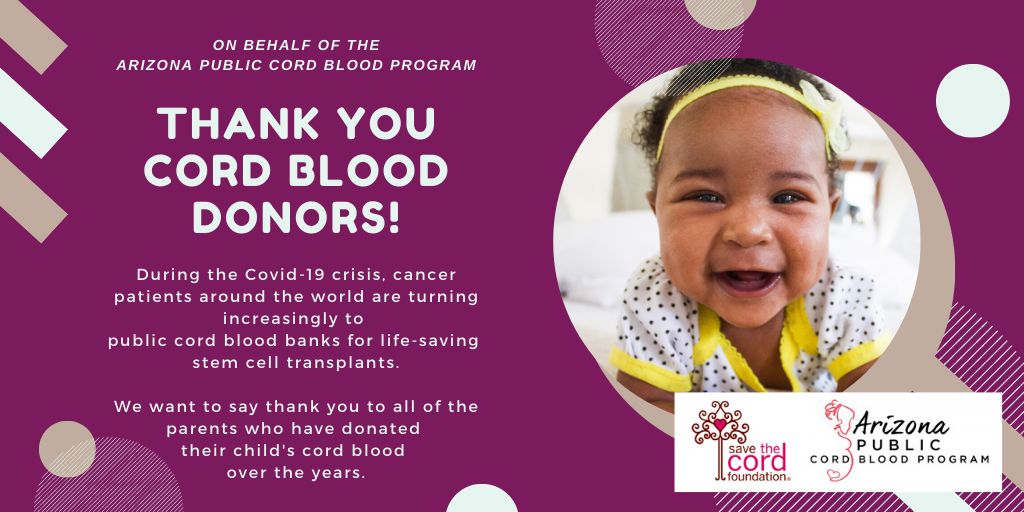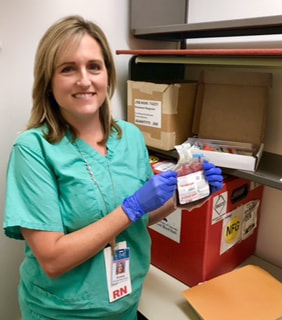Arizona Public Cord Blood Program
|
Save the Cord Foundation is proud to be the education partner for the Arizona Public Cord Blood program. Through this innovative program the Arizona Department of Health Services and the Arizona Biomedical Research Centre provide Arizona with a public umbilical cord blood banking program. It is free to donate your newborn’s cord blood to this program, if you are giving birth at any of the participating hospitals.
The Arizona Public Cord Blood Program is a offered at five locations in Arizona: |

In the past when a baby was born, the umbilical cord was just thrown away with no thought as to a greater purpose. But today Save the Cord Foundation is working on multiple levels to change this practice. We believe strongly that cord blood is a valuable resource that should not be thrown away.
Cord blood from the umbilical cord can be collected to treat children and adults with certain genetic or life-threatening diseases such as leukemia or lymphoma. It is currently being used to treat over 80 life-threatening diseases. More than 22,000 patients around the world have received transplants from donations to the public cord blood banks. Donating umbilical cord blood is a generous gift that could change someone else’s life.
We are proud that the State of Arizona continues to lead the nation in providing innovative programs supporting the collection of cord blood. Learn more about the Arizona Public Cord Blood Banking Program and your options as a parent.
How is cord blood used?
Umbilical cord has blood-forming cells. These cells are collected, stored and made available for any patient who needs donated cells due to a disease in their own cells such as leukemia or a genetic disorder. A transplant replaces a patient’s unhealthy blood-forming cells with healthy ones.
Why are more donations needed?
Unfortunately, seven out of 10 people will not have a suitable matched donor in their family and will depend on the national cord blood bank managed by NMDP/Be The Match Registry® Be The Match to find a match. Adding more cord blood units to the registry increases the likelihood that all patients will find a match. Racially and ethnically diverse donors are especially needed. Patients are more likely to match tissue types with someone who shares their racial or ethnic heritage. And since nearly 35% of cord blood units used in NMDP transplants go to ethnically or racially diverse patients, we strongly encourage donations from all racial and ethnic backgrounds.
What options are available for saving umbilical cord blood?
You can choose to:
For a public cord blood bank, there is no cost to the donor. The cord blood will be stored at the public cord blood bank until needed by a patient; it is not saved exclusively for your family. Arizona currently operates a public cord blood bank through a partnership with the University of Colorado Cord Blood Bank which is FDA licensed. This is the backbone of the Arizona Public Cord Blood Program and it is free to donate your child’s cord blood to this program.
Private banking allows the family to control the future use of the cord blood for the baby or family and it may be an appropriate choice for your family. However, this method requires the donor to pay a fee to process and store the cord blood. The fees and contracts can vary from one provider to another. Accreditation qualifications can also differ greatly and should be taken into account.
Why donate to a public cord blood bank versus a private cord blood bank?
There is no cost to the donor, it is free and by donating umbilical cord blood, you have chosen to help someone in need of a potentially life-saving transplant. The cord blood will be stored at the public cord blood bank until needed by a patient; it is not saved exclusively for your family. Private banking requires the donor to pay a fee to process and store the cord blood.
How is cord blood collected?
Donating cord blood does not interfere with the labor or delivery process. During the delivery, all of the focus is on you and your baby. No blood is taken from your baby, only from the cord and placenta are collected after the baby is born and no longer needs these. For the Arizona Public Cord Blood Program, the cord blood is collected during the delivery process at one of our partner hospitals. Then, it is transferred to the University of Colorado Cord Blood Bank where it will be processed. If the cord blood unit is suitable for a transplant, it is tissue typed, then frozen and stored in a liquid nitrogen freezer. The cord blood unit is then listed on the national cord blood registry managed by NMDP/Be The Match Registry®.
Are there any risks in donating?
Collecting cord blood is completely safe for babies and mothers. Donating cord blood does not interfere with the labor or delivery process. It will not affect your baby’s health and no blood is taken from your baby, only from the cord and placenta after they are detached from your baby and no longer needed.
Is donated cord blood always stored?
Not all donated cord blood is eligible to be banked. The collected cord blood unit must be large enough and free from infection or diseases. This ensures the cord blood unit is suitable for a patient needing a transplant.
Will my privacy be protected?
You and your baby’s identity are always kept confidential by the public cord blood bank. The cord blood unit is given a number at the hospital and this is how it is identified on the registry and at the public cord blood bank.
Am I eligible to donate?
You may be eligible to donate if you are:
How do I donate?
If you are interested in donating your baby’s cord blood and plan to deliver your baby at one of the participating sites listed above:
Thank you for your interest and support of the Arizona Public Cord Blood Banking Program.
Cord blood from the umbilical cord can be collected to treat children and adults with certain genetic or life-threatening diseases such as leukemia or lymphoma. It is currently being used to treat over 80 life-threatening diseases. More than 22,000 patients around the world have received transplants from donations to the public cord blood banks. Donating umbilical cord blood is a generous gift that could change someone else’s life.
We are proud that the State of Arizona continues to lead the nation in providing innovative programs supporting the collection of cord blood. Learn more about the Arizona Public Cord Blood Banking Program and your options as a parent.
How is cord blood used?
Umbilical cord has blood-forming cells. These cells are collected, stored and made available for any patient who needs donated cells due to a disease in their own cells such as leukemia or a genetic disorder. A transplant replaces a patient’s unhealthy blood-forming cells with healthy ones.
Why are more donations needed?
Unfortunately, seven out of 10 people will not have a suitable matched donor in their family and will depend on the national cord blood bank managed by NMDP/Be The Match Registry® Be The Match to find a match. Adding more cord blood units to the registry increases the likelihood that all patients will find a match. Racially and ethnically diverse donors are especially needed. Patients are more likely to match tissue types with someone who shares their racial or ethnic heritage. And since nearly 35% of cord blood units used in NMDP transplants go to ethnically or racially diverse patients, we strongly encourage donations from all racial and ethnic backgrounds.
What options are available for saving umbilical cord blood?
You can choose to:
- Donate your baby’s umbilical cord blood to a public cord blood bank, where it will be available to anyone who needs it.
- Pay to store it in a family (private) cord blood bank, where it is reserved for your own family.
- If you do nothing, the umbilical cord will be discarded after birth–simply thrown away as medical waste.
For a public cord blood bank, there is no cost to the donor. The cord blood will be stored at the public cord blood bank until needed by a patient; it is not saved exclusively for your family. Arizona currently operates a public cord blood bank through a partnership with the University of Colorado Cord Blood Bank which is FDA licensed. This is the backbone of the Arizona Public Cord Blood Program and it is free to donate your child’s cord blood to this program.
Private banking allows the family to control the future use of the cord blood for the baby or family and it may be an appropriate choice for your family. However, this method requires the donor to pay a fee to process and store the cord blood. The fees and contracts can vary from one provider to another. Accreditation qualifications can also differ greatly and should be taken into account.
Why donate to a public cord blood bank versus a private cord blood bank?
There is no cost to the donor, it is free and by donating umbilical cord blood, you have chosen to help someone in need of a potentially life-saving transplant. The cord blood will be stored at the public cord blood bank until needed by a patient; it is not saved exclusively for your family. Private banking requires the donor to pay a fee to process and store the cord blood.
How is cord blood collected?
Donating cord blood does not interfere with the labor or delivery process. During the delivery, all of the focus is on you and your baby. No blood is taken from your baby, only from the cord and placenta are collected after the baby is born and no longer needs these. For the Arizona Public Cord Blood Program, the cord blood is collected during the delivery process at one of our partner hospitals. Then, it is transferred to the University of Colorado Cord Blood Bank where it will be processed. If the cord blood unit is suitable for a transplant, it is tissue typed, then frozen and stored in a liquid nitrogen freezer. The cord blood unit is then listed on the national cord blood registry managed by NMDP/Be The Match Registry®.
Are there any risks in donating?
Collecting cord blood is completely safe for babies and mothers. Donating cord blood does not interfere with the labor or delivery process. It will not affect your baby’s health and no blood is taken from your baby, only from the cord and placenta after they are detached from your baby and no longer needed.
Is donated cord blood always stored?
Not all donated cord blood is eligible to be banked. The collected cord blood unit must be large enough and free from infection or diseases. This ensures the cord blood unit is suitable for a patient needing a transplant.
Will my privacy be protected?
You and your baby’s identity are always kept confidential by the public cord blood bank. The cord blood unit is given a number at the hospital and this is how it is identified on the registry and at the public cord blood bank.
Am I eligible to donate?
You may be eligible to donate if you are:
- Expecting a single birth.
- Expecting a delivery of at least 35 weeks gestation.
- At least 18 years old.
How do I donate?
If you are interested in donating your baby’s cord blood and plan to deliver your baby at one of the participating sites listed above:
- Let your health care provider know as soon as possible that you would like to donate your baby’s cord blood.
- When you are ready to deliver your baby, be sure to remind the Labor and Delivery staff know that you would like to donate to the public cord blood bank.
- After your baby is born, feel good. You and your child may have just saved a life.
Thank you for your interest and support of the Arizona Public Cord Blood Banking Program.






